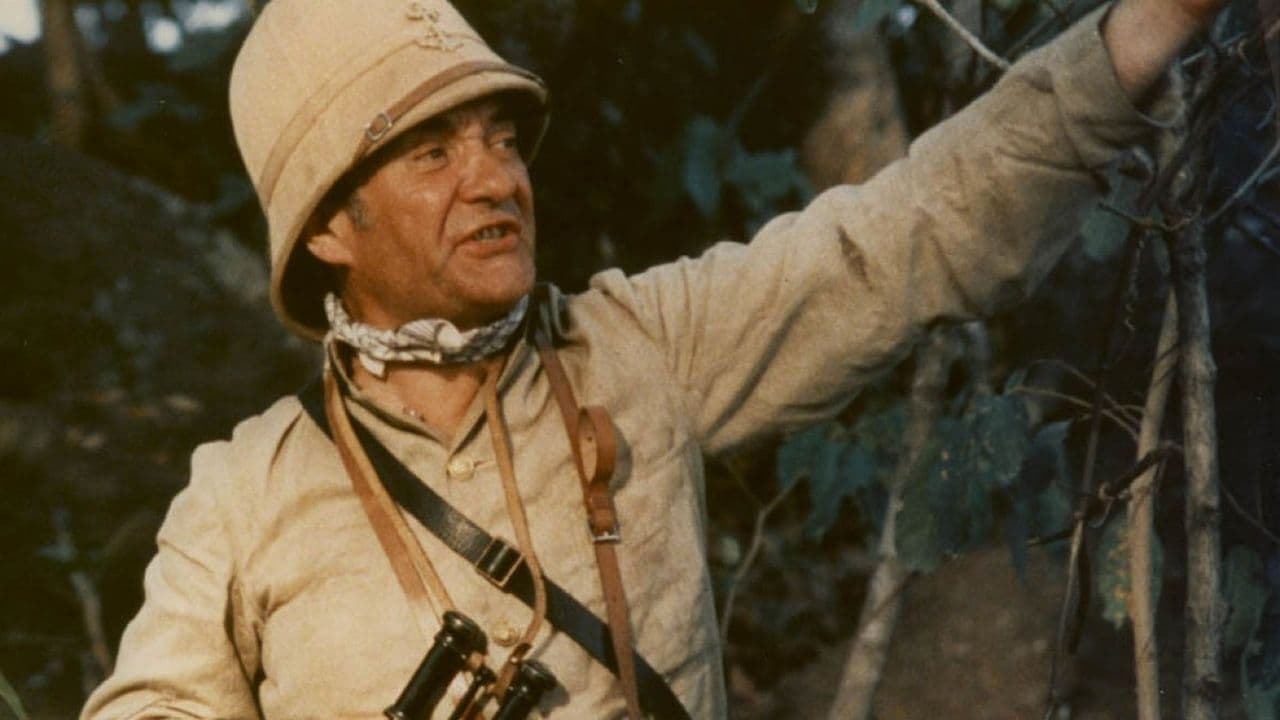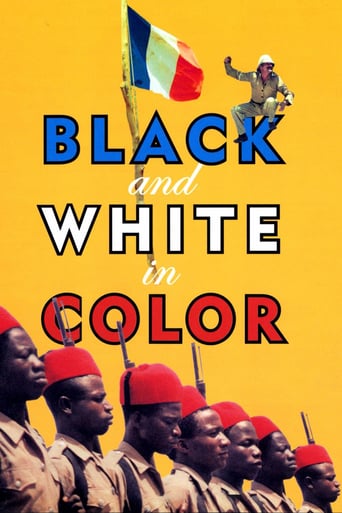

Black and White in Color is a 1976 film about the unctuous specter of war and its curious effects on the small African colonial community of Fort Coulais. The white colonists of the town largely consists of wholesale merchants the Rechampots (Dufilho, Legros and Doll), the sexually frustrated Simon's (Monnet and Rouvel), two bumbling Catholic priests (Berling and Boignan), a permanently drunk sergeant (Carmet) and young geographer Hubert (Spiesser). It is through a care package sent to Hubert that the townsfolk discover France has been at war with Germany for a little over a month and in a patriotic fervor decide to take on the nearby settlement in German Togoland. To do this however they must coop the large black population.Exploding onto the scene as a powerful calling card for director Jean-Jacques Annaud, Black and White in Color benefits from some sly and surprising comic set-pieces. Those expecting the dour humorlessness of Enemy at the Gates (2001) will instead find moments of genuine mirth, plain and in the open among the noxious absurdity of war. In one scene palanquin carriers chant clever songs as they labor to bring the priests to their destination. While whites hear them and think they're gibberish, the locals know they're singing about the quality of their passengers. On many occasions the white colonists celebrate their piddly (and few) successes while black Catholic converts Caprice (Barrier) and Assomption (Atchory) shake their heads in disbelief; muttering to themselves "ugh, white people."There are times when the light-hearted humor threatens to sabotage the themes of the story from within. Thankfully we have the character progression of the young Hubert Fresnoy who at first seems the least enthused about battling the Germans. As the only learned member of the colonists, Hubert reluctantly leads the defense of Fort Coulais and the Sisyphean task of taking the neighboring German settlement. When we first meet him, he's drafting a letter to a school friend. In it he writes "I dare say, that in many respects the natives are not far from meriting the honored name of men," pitting him as the most enlightened of his compatriots. Yet war takes a toll on idealists as both Hubert and the audience come to realize. A toll that might just rob him of his humanity.If ever there was a character that best exemplifies the goals of the film it'd be Jacques Dufilho's Paul Rechampot. While being the most outspoken and vain of the white colonists, he's also the most selfish, going so far as to bury cans of sardines and other supplies so their conscripted army won't take them. Bearing a thick, angry mustache, fierce eyes and brimming with hubris, the man against the elements superimposes a thesis of absurdity; like herding cats or confidently pissing in the wind.What's ultimately missing from Black and White in Color is serious input from the locals themselves. Shot entirely in Cote d'Ivoire, the film feels like a satirical screed on war, religion and colonialism which, while well argued, nevertheless feels like it could have used at least one strong black character. Assomption gets a moment to shine as he gatekeeps for Hubert but we never get to really see the horrors of war up close from the subjugated perspective; from the soldier's perspective. So many men die as a result of hostilities yet the film's preoccupation with the white settlers blunts what could have made for a more damning film.Thankfully, Jean-Jacques Annaud's clever direction and a few choice satirical images sure to stick with you make Black and White in Color worth a gander. Sure it might be plagued with one too many "white- guilt chic" moments, but at least you know it's heart is in the right place.
... View MoreIn this biting satire on war, colonialism and racism, French troops in 1915 Gabon learn that their country has declared war on Germany. Knowing that there are German troops nearby, they decide to train the colonized Africans to fight. Only one person in the French contingent seems to have an iota of reason to his thinking.I think that "Noirs et blancs en couleur" (called "Black and White in Color" in English) shows imperialism in its most pathetic, depraved form. Not only do the colonizers want the colonized people to fight for the empire, but there's one scene that especially emphasizes this. When some rich people go out for a picnic, they watch the fighting as though it's a spectator sport; a form of entertainment, if you will. But they get mighty shocked when they see how violent it is. Apparently, these colonialists are so completely brainwashed by their own pro-war, nationalistic propaganda, that they fail to realize how ugly war actually is, and they're in for a rude awakening when they find the truth.Anyway, this is definitely a movie that I recommend. We could use some advice from it, what with the mess that we've made in Iraq. Certainly a good one for Jean-Jacques Annaud, and it definitely deserved Best Foreign Language Film.
... View Morei've read thru the other comments twice now and think perhaps most did not see the same film i did. this doesn't quite click in my head as just an anti-war film; it is something else, a darker thing that aims at a soft rot inside us all.the development of the character of the geographer, fresnoy, was like a rusty nail hidden in the pudding. he was in the beginning so likeably idealistic; we hoped for him.out of date papers arrive and "war" is discovered in an old issue. in a sudden fervor of nationalistic spirit the colonials are senselessly eager to march into conflict; they are a barely controlled mob. all but one; fresnoy stands apart and counsels talk rather in lieu of instant bloodshed. he is the human voice, his the ignored pleas.after the 'defeat' the fresnoy gets another hearing and with forceful initiative takes charge of a situation seen as hopeless by the others; while they quibble and cavil he begins to organize the outpost for war. he is quite good at this and earns everyone's grudging respect as the fort takes on a martial aspect and the idea of safety once again takes hold.but something happens to fresnoy. most of the colonials are slapstickish fools first, foremost and forever. but fresnoy develops slowly from idealist to man of authority. with power he evolves into a dark shadow of his former self. it is not unlike the descent of kurtz in apocalypse now/heart of darkness. his black mistress openly flaunted, his imperious air, his elevation of africans into minor positions of power all might be seen as his being a moderating and liberating force. i don't think so. i think he has begun to be eaten from the inside by the power he has tasted and that his life will never be the same. the end, where he is seen as almost a twin to the German officer and they both admit to being socialists, is meant only, i believe, as bitter irony.
... View MoreThis film stands in its caliber up there with Oh! What a Lovely War (1969), All Quiet on the Western Front (1930), and Johnny Got his Gun. It is World War in a microcosm. The film is not dated, nor will it ever be. All long as men fight for territory or for ideals, this film will stand among the top few as a testament to the idiocy and pettiness of war. Was not available for many years. "Ich auch"-- closing line -- as the two lieutenants walk together off set-- burned in my memory from one viewing nearly 30 years ago. If you saw it you will remember.
... View More